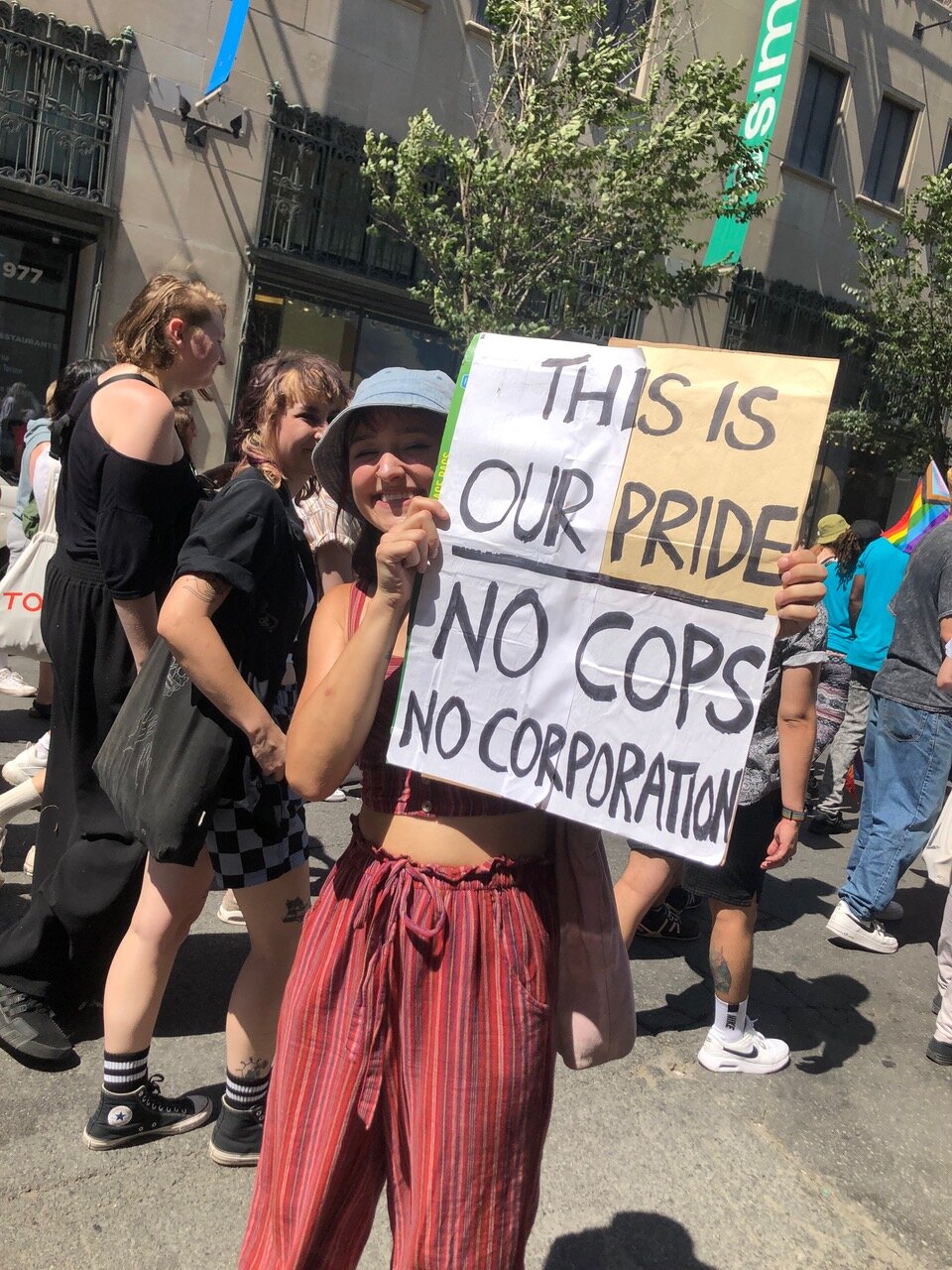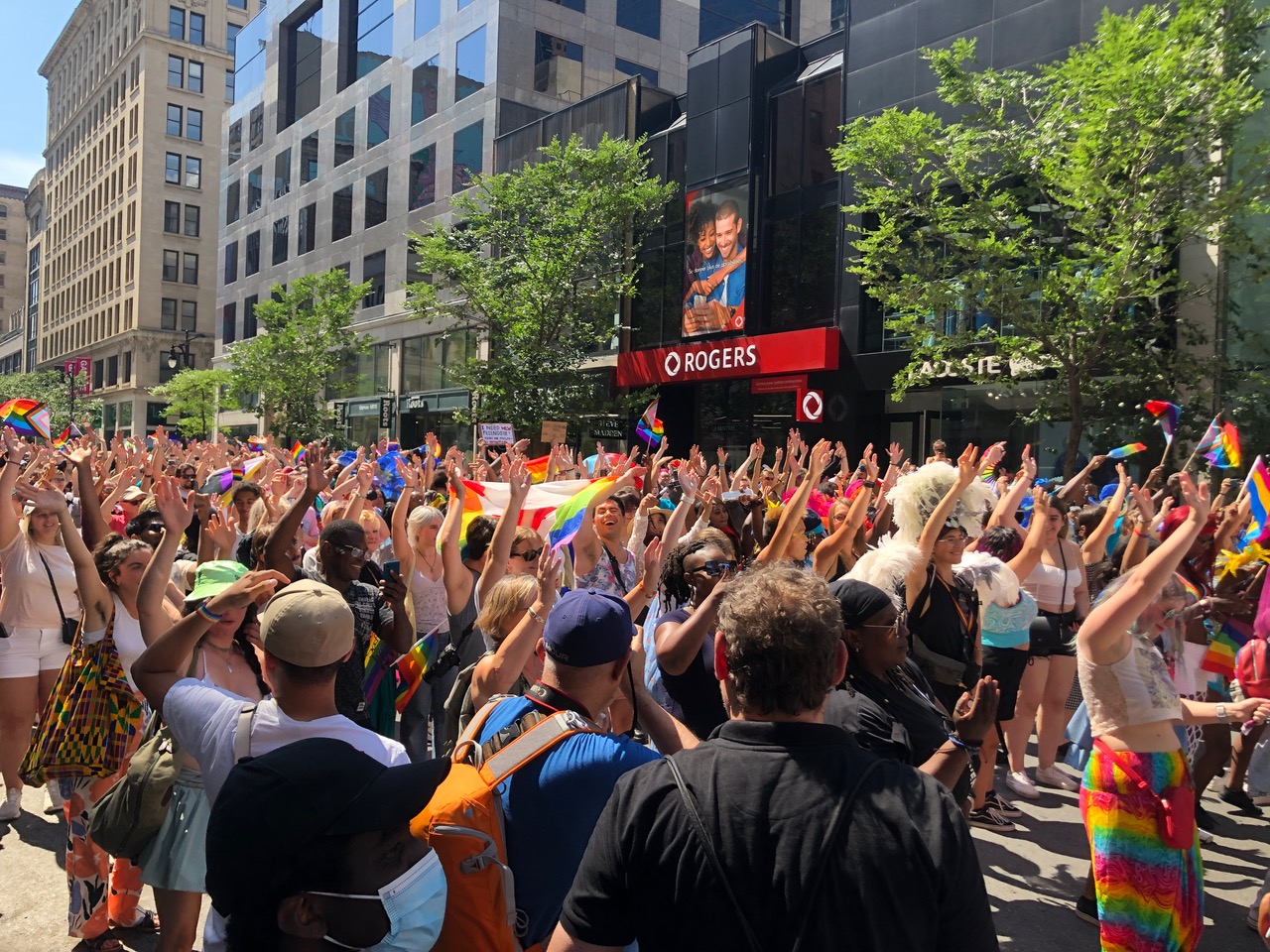I was still in bed on Sunday, blearily scrolling Instagram, when I read the news: Montreal’s Pride parade was cancelled just a few hours before its scheduled start. The announcement left thousands of prospective attendees—and Montreal’s broader queer community—scratching their heads. How does a major city’s entire Pride parade get called off the day of?
Fierté Montréal, the organization responsible for planning the city’s official Pride events, didn’t immediately offer much clarity. Their initial statement claimed the decision had been made in agreement with the city’s police department after the organization learned they didn’t have enough volunteers working security to ensure that the event could take place safely.
The details changed slightly in subsequent statements: There were COVID-related staffing shortages. Fierté had simply forgotten to hire enough designated security staff to monitor the route of the parade. They didn’t realize their mistake until the last minute. The cops were not involved, and organizers had decided alone, only alerting the police and the city after they’d made the call.
Lots of questions remain. By Tuesday, Fierté had announced it was launching its own internal investigation, and the next day, Montreal mayor Valérie Plante called for an independent inquiry.
The cancellation of the official parade was a source of anger and disappointment for many in Montreal’s LGBTQ2S+ community. But a grassroots-led march that swiftly popped up in its place turned out to be the most exciting, touching and inspired Pride I have ever attended.
Instagram infographics and TeePublic merch constantly crow at us that “Pride was a riot, not a parade”—a message that reads toothless at best and cynical at worst by virtue of its medium. “Sure,” I always think. “And what now?”
Sunday’s makeshift parade gave me a brief glimpse at what a decorpratized Pride march might actually look like in practice—and reinforced that a high-budget, float-bloated Pride doesn’t reflect queer libertation’s roots, or the pathway to its succesful future.

Credit: Christopher DiRaddo
In typical Montreal fashion, within hours of the parade’s cancellation, a protest had already been planned in a gay village park. I arrived in the early afternoon and joined a small group who’d decided to brave the near 40-degree heat, and who were milling around with signs and flags, not quite certain of what to do next. A second cluster of a couple hundred people, who’d been marching through the city’s downtown, passed by the park moments later, cheering and chanting in the street. The park protestors joined them, doubling their ranks.
This was the first Pride march I’d attended in nearly eight years, and it was worth it. As we marched down the village’s main drag, the group swelled. People flocked from the sidewalks and from patios to join the procession. The crowd screamed, they cheered, they blared on vuvuzelas. Drag queens snapped their fans. Shirtless puppies serenaded the crowd with acoustic Queen covers. We did what queer people do best: got obnoxiously, gloriously, beautifully loud.
No one person, designated group or institution called the shots. A handful of marchers at the front chose where we’d head next, making decisions on the fly. Chants bubbled up throughout the crowd:
Tout le monde déteste la police.
Whose streets? Our streets.
Avec nous, dans la rue.
Hey, hey. Ho, ho. Corporate Pride has got to go.
By the time the procession left the village, it looked to be at least 1,000 people long. We wound uptown, and the crowd blocked off several major streets, slowing traffic and turning heads. About half a dozen cops on bikes and motorcycles, who had been following the original group of marchers, kept ahead of the crowd.
The mood was angry and joyful at once. Fierté had specifically asked that Montrealers refrain from showing up to non-sanctioned events, which felt like an even deeper disappointment. The past few years have seen LGBTQ2S+ people be hit with increased harassment and violence and an onslaught of homophobic and transphobic legislation. We’ve been abandoned by our governments and left to deal with rising HIV and STBBI rates, ballooning rates of houselessness and addiction and a steadily growing monkeypox crisis.
To be fair, Fierté has spoken out loudly about some of these issues this Pride season. Yet, on Sunday, this organization that claimed to represent us was asking us to avoid gathering and celebrating, avoid voicing our anger, avoid loudly demanding to be seen and heard.
No matter. We were queer and we were most definitely here.
As the march hit Rue St. Laurent, in the city’s Plateau Mont-Royal neighbourhood, workers stuck their heads out of storefronts to wave and cheer, and tables of patio-goers at Sunday brunch looked on. When the crowd broke into another anti-police chant, a man sitting on a nearby bench with his toddler piped up. “Yeah, man! Fuck the police!” he yelled, while the kid pumped their fists excitedly.
Others seemed less pleased with the loud interruption—but Pride was never meant to entertain straight people, nor to make them comfortable.
After nearly an hour of marching, the group paused for a minute of silence to honour victims of the AIDS crisis. Not long after, we marched to Place des Arts, a square in the city’s entertainment district. There, we cheered together a final time, then dispersed to cool off in the nearby fountains.
Montreal still managed to have its Pride march—without the large police or security presence, without TD Bank–branded rainbow flags, without a pink-shirt-clad Justin Trudeau.
As LGBTQ2S+ rights come further under attack, pinkwashed advocacy won’t save us. We don’t need rainbow capitalism. We need the strength, wisdom and spirit of our roots. We need the anger, fierceness and love of our present. Above all, we need each other.


 Why you can trust Xtra
Why you can trust Xtra


